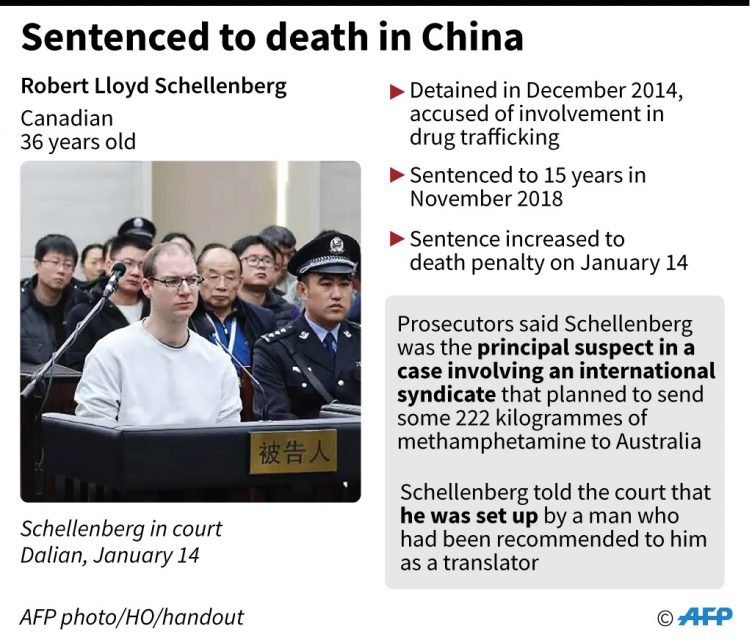
BEIJING, China (AFP) — A Chinese court was expected to hold a hearing Thursday on a Canadian man’s appeal against a death sentence for drug smuggling in a case that has deepened a diplomatic spat between Beijing and Ottawa.
Robert Lloyd Schellenberg, 36, was sentenced to death in January after a court deemed his previous 15-year prison sentence too lenient.
The appeal hearing comes a day after a top executive of Chinese telecom giant Huawei, Meng Wanzhou, appeared in court in Canada to fight a US extradition bid that triggered the diplomatic storm.
Schellenberg’s case is seen as potential leverage for Meng, who was arrested on a US extradition request related to Iran sanctions violations — a link that Beijing has repeatedly denied.
Following the Huawei executive’s arrest in December, China detained former Canadian diplomat Michael Kovrig and businessman Michael Spavor, in what observers saw as retaliation.
Canadian Prime Minister Justin Trudeau said China had “chosen to arbitrarily” sentence Schellenberg to death and his government has pleaded for clemency.
Schellenberg’s appeal was expected to take place at the Dalian Intermediate People’s Court in northeastern Liaoning province.
China is “a country ruled by law” and would “protect the legal rights” of Schellenberg, the Chinese foreign ministry said.
Canadian officials planned to attend Thursday’s hearing.
Ottawa said Wednesday it was “extremely concerned that China has chosen to apply the death penalty, a cruel and inhumane punishment”.
Canadians detained
Schellenberg was originally sentenced to 15 years in prison and a 150,000 yuan ($22,000) forfeiture in November.
But following an appeal, the high court in Liaoning ruled in December that the sentence was too lenient given the severity of his crimes.
About a month later, his sentence was changed to capital punishment.
China has executed foreigners for drug-related crimes in the past, including a Japanese national in 2014, a Filipina in 2013, and a Briton in 2009.
Last week, another Canadian, Fan Wei, was sentenced to death for drug trafficking in a separate case in southern China.
Kovrig and Spavor, meanwhile, have been denied access to lawyers and allowed only monthly consular visits.
Days after Canada launched the extradition process against Meng in March, China announced it suspected Kovrig of spying and stealing state secrets. It alleged fellow Canadian Spavor had provided him with intelligence.
Meanwhile, Huawei’s Meng was back in court in Vancouver on Wednesday, with her lawyers arguing that the US case was politically motivated.
Her firm says she is innocent.
Huawei is also in the US crosshairs as Washington seeks to convince Western nations to shun the telecom firm over security concerns.
The diplomatic row appears to have has spilled over into the economic arena: China has banned Canadian canola and pork shipments worth billions of dollars.
Ottawa has pressed Washington — which is locked in a trade dispute with China — to step up its pressure on behalf of the detained Canadians.
© Agence France-Presse







